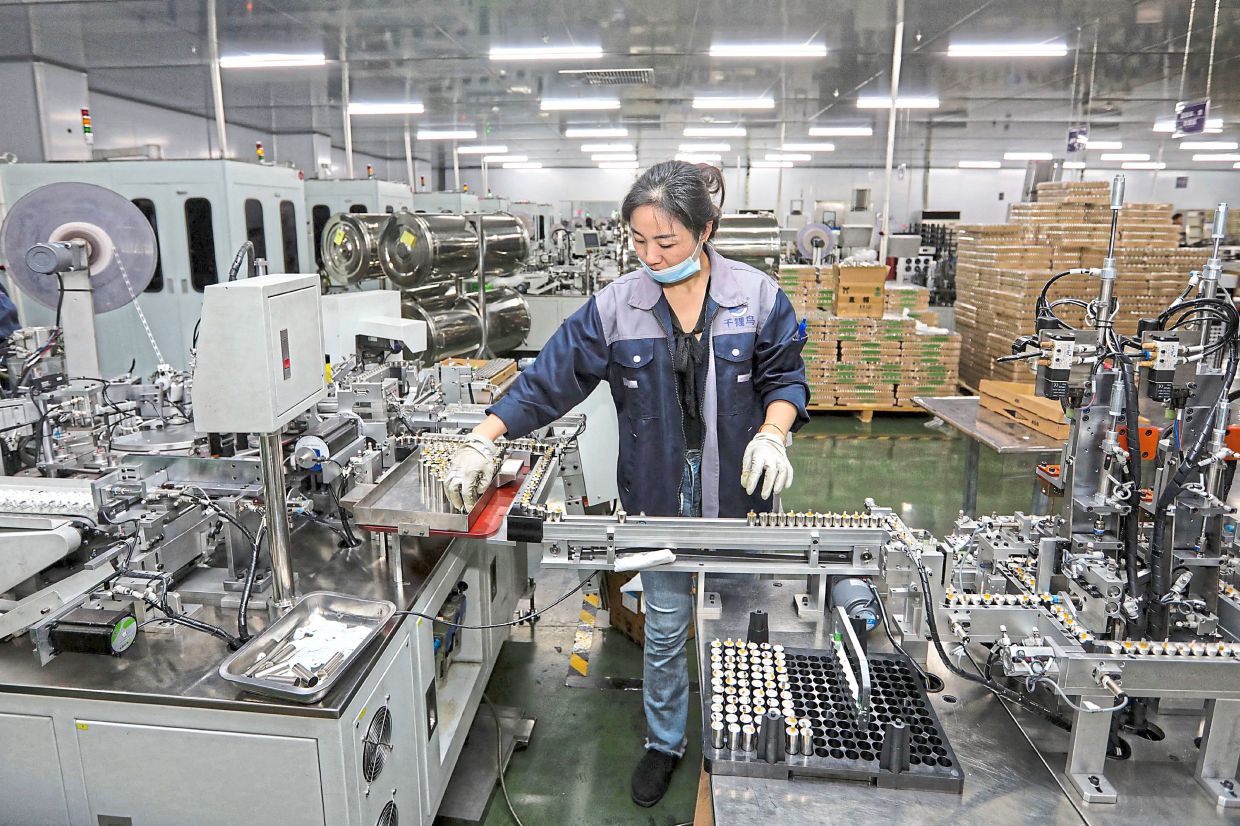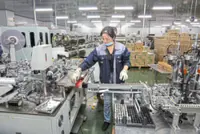
Uptick in demand: Workers at an assembly line manufacturing Zeekr X models in Chengdu, Sichuan province. China’s manufacturing industry has been moving up the value chain, accounting for around 30% of the global total. — Reuters
BEIJING: Several chief China economists of foreign banks have expressed their confidence in the Chinese economy, which posted a robust 5.2% year-on-year (y-o-y) growth in 2023, recent interviews with Xinhua reveals.
China’s National Bureau of Statistics (NBS) disclosed the full-year performance of its major economic indicators for 2023, with the gross domestic product (GDP) hitting a record 126.06 trillion yuan (US$17.7 trillion).
“China remains a very important driver of global growth,” said Xiong Yi, chief China economist at Deutsche Bank.
China’s GDP growth rate is very impressive, well above that of global average and the average of developing countries, said Xiong, adding that the International Monetary Fund forecast that the global economy in 2023 grew by 3%, with an average growth rate of 1.5% for developed economies and 4% for developing countries.
Consumption, a mainstay of the Chinese economy, contributed 82.5% of the GDP growth in 2023, according to the NBS.
“A major reason behind the steady expansion of consumption is that China’s per capita disposable income has been growing,” said Xiong.
After deducting price factors, China’s per capita disposable income rose 6.1% from the previous year.
Notably, the index for China’s rural residents grew at a faster pace than that of the city dwellers in the period, suggesting a narrowing gap between the two groups.
Wang Tao, chief China economist and head of Asia Economic Research at UBS, stressed that growth of export volume picked up further in December last year, leading to a notable rebound in the fourth quarter from the third quarter.
“We forecast exports to improve modestly on the upswing of the global tech cycle,” said Wang.
According to the General Administration of Customs, despite the global headwinds in trade, China’s exports have reached a new high on a high base and retained its global share.
In recent years, China’s manufacturing industry has been moving up the value chain, with the added value of China’s manufacturing industry accounting for around 30% of the global total.
“The competitiveness of China’s manufacturing industry in the global market continues to increase,” said Xiong, stressing that “exports of the three types of new star products in 2023, namely new energy vehicle, lithium battery and solar cell, exceeded one trillion yuan by value for the first time, adding to the upward momentum in foreign trade.”
Lu Ting, chief China economist at Nomura, noted that fixed-asset investment growth quickened to 4% year-on-year in December from 2.9% in November, above market expectations.
“According to the latest fixed-asset investment data, it seems the one trillion yuan of additional central government bonds on infrastructure projects may have started to have some positive effects in December,” said Lu.
Experts believe that more positive factors are accumulating for China’s growth prospect.
“In the coming months, we expect property activities and property market to stabilise, helping to underpin household confidence.
“That should support continued post-Covid consumption recovery along with the economy and labour market,” said Wang Tao.
The Chinese government has proposed that proactive fiscal policies should be appropriately strengthened, and their effectiveness improved.
“Over the past months, with the acceleration in issuance of local government special bonds, the construction of affordable housing and public infrastructure for both normal and emergency use and the renovation of shanty towns in cities, more policy effects on the fiscal front will be unleashed in 2024,” said Xiong.
Liu Jing, chief economist for Greater China at HSBC, believes that China still has sufficient policy space to deal with economic fluctuations.
“China’s central government debt level is far below that of developed economies, which means there is still ample room for fiscal policy adjustments.”
Liu said that as the US Federal Reserve (Fed) is expected to lower its benchmark interest rate this year, the interest rate spread between the US and China bond is likely to further narrow down, which provides more space for China’s monetary policy.
For China, the possible policy shift of the Fed may help boost external demand and thus improve Chinese exports, and attract foreign investment, Liu added.
Data from China’s Commerce Ministry show that in the first 11 months of 2023, the number of foreign-invested enterprises registered in China increased by 36.2% year-on-year.
The actual use of foreign investment in China reached more than one trillion yuan, which is still at an all-time high.
Xiong believes that China is still a very important market for foreign investors.
“After relaxation of Covid-19 rules, more executives of foreign enterprises visited China. Via talking with several of them, I found that they are generally upbeat about China’s development prospects,” said Xiong.
With the further opening-up of China’s financial sector, the facilitation of cross-border capital flows continues to improve, and the attractiveness of foreign investors to the Chinese market is expected to grow, Xiong added. — Xinhua










































